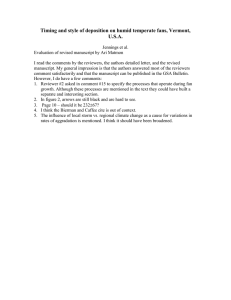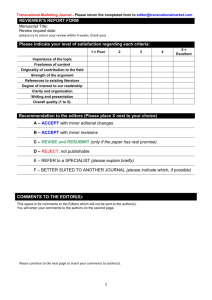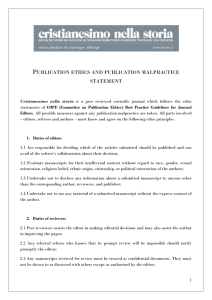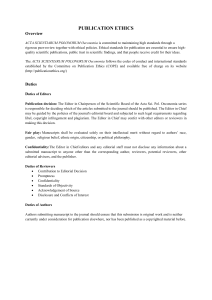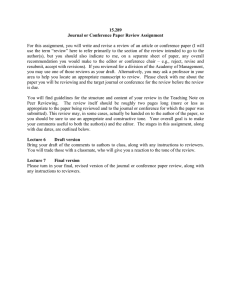Associate Editor Guidelines
advertisement
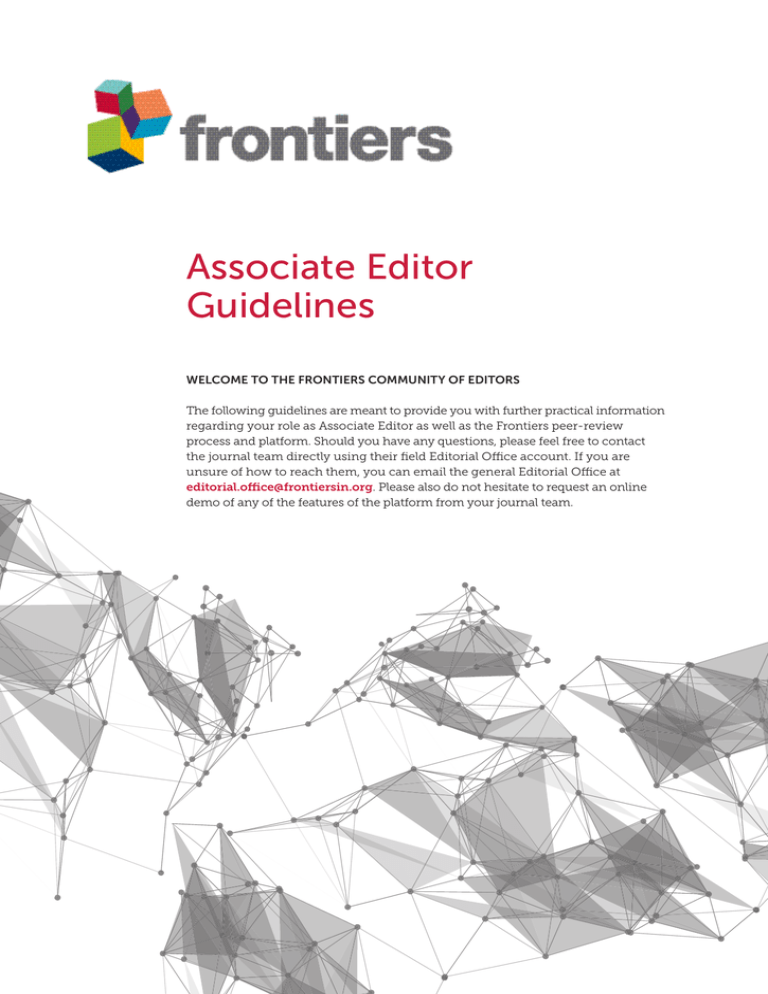
Associate Editor Guidelines WELCOME TO THE FRONTIERS COMMUNITY OF EDITORS The following guidelines are meant to provide you with further practical information regarding your role as Associate Editor as well as the Frontiers peer‑review process and platform. Should you have any questions, please feel free to contact the journal team directly using their field Editorial Office account. If you are unsure of how to reach them, you can email the general Editorial Office at editorial.office@frontiersin.org. Please also do not hesitate to request an online demo of any of the features of the platform from your journal team. LAST UPDATED ON: 17th OF AUGUST, 2016 Important changes in last update 2 Section 3.3 Once reviewers are assigned, they are expected to fill out a template review questionnaire within 15 days. Section 3.6 Once all reviewers have completed the review process, either by endorsing the manuscript or withdrawing their participation, you should proceed to take a final decision on the manuscript. [...] Frontiers | Associate Editor Guidelines TABLE OF CONTENTS 1. ABOUT FRONTIERS 4 2. 2.1 2.2 2.3 2.4 YOUR ROLE AS ASSOCIATE EDITOR Complete your Frontiers profile on Loop Build a board of 10-15 Review Editors Submit your Inaugural Article Consider organizing a Research Topic 4 5 6 7 7 3. 3.1 3.2 3.3 3.4 3.5 3.6 3.7 3.8 THE FRONTIERS PEER-REVIEW PROCESS Accessing manuscripts Submission and initial evaluation Inviting reviewers Giving authors access to the interactive review forum Mediating the discussion Making the final decision Granting extensions Editorial independence 7 8 9 10 12 13 14 15 15 4. 4.1 4.2 SUBMITTING MANUSCRIPTS TO FRONTIERS AS AN ASSOCIATE EDITOR Associate Editor discount Institutional agreements 16 16 16 3 Frontiers | Associate Editor Guidelines 1. ABOUT FRONTIERS Frontiers is a leading open-access publisher. Established in 2007, Frontiers drives innovations in peer-review, post-publication review, impact metrics, and transparent academic profiles, and provides an ecosystem of open-science tools. Frontiers stands for the following fundamental principles: • Fair, fast, rigorous, and transparent peer-review – A uniquely interactive and collaborative process in real time between authors and reviewers. Reviewers are acknowledged on published papers in recognition of their important contribution, as well as to safeguard transparency. • Community-driven – Frontiers Journals are rooted in academic communities and are run by world-renowned researchers and scholars. Our Loop network provides a personalized data stream for each user, targeting articles to the right readership and maximizing impact. • Tier-climbing and impact-neutral publishing – Papers are accepted based on objective criteria, not potential impact; the latter being evaluated by the community post-publication, through article-level impact analytics that track the number of views, downloads, and demographics of readers, as well as the “buzz” on social media and science blogs. Crowdsourcing algorithms democratically select the most important studies to showcase to a broader readership as Tier-climbing papers. • Open-access and unrestricted global visibility – Articles are published under the Creative Commons Attribution License (CC-BY), visible to search engines, and can be accessed, distributed, and reused by anyone for free, with appropriate citation. • Below average publishing fees and fair distribution of the resources – For articles to be freely available upon publication, they are subject to a publishing fee (available on a journal basis). Through our waiver program, we strive to ensure that publishing fees do not become an obstacle. Chief and Associate Editors receive a 15% discount on all Category A article types, as do contributions to Research Topics. There are no charges for color figures or supplementary material. • Strong IT focus – Our web platform is designed in-house, evolving according to constant feedback from users in order to improve the accountability, efficiency, quality, fairness, and impact of scholarly publishing. 2. YOUR ROLE AS ASSOCIATE EDITOR As an Associate Editor, you play a key role in establishing and growing your specialty. Each specialty has an average of 15-20 Associate Editors, including you. Once the specialty is established, your primary role will be to oversee the peer-review process of manuscripts (section 3 of these guidelines). 4 Frontiers | Associate Editor Guidelines 2.1 COMPLETE YOUR FRONTIERS PROFILE ON LOOP To join the editorial board, you created an account on our research network, Loop, which will allow you to receive invitations and access your editing assignments. We would now ask you to please complete your profile within one or two weeks by adding a photo, a brief bio, as well as a number of specific keywords related to your expertise. These will be important to help ensure that you receive the most appropriate editing invitations. To update your keywords, please visit your Loop profile and fill out the Expertise brick in the right hand side menu. Examples of good keywords: 5-HTTLPR, serotonin transporter gene, serotonin, neurotransmitter reuptake, mood, depression, mouse models Examples of vague keywords: brain, genetics, cell biology, neuroscience, psychology, physiology Please also take a moment to confirm your publications (see screenshot below). 5 Frontiers | Associate Editor Guidelines 2.2 BUILD A BOARD OF 10-15 REVIEW EDITORS Review Editors are reviewers who are part of the editorial board and who have agreed to receive regular review invitations from the journal. Assessing the soundness and quality of manuscripts, they interact in real time with authors in a collaborative review process with the aim to improve manuscripts that fulfill these criteria to their highest standard. Reviewers who have endorsed a manuscript for publication, together with the handling Associate Editor, are always acknowledged on the accepted article. In contrast, Review Editors who do not endorse a manuscript remain anonymous. You should build a board of 10 to 15 Review Editors within the first months of your appointment. These should be established researchers or experts in the field, e.g. readers, lecturers, principal investigators, assistant professors (not necessarily with tenure), or more senior. Exceptionally, outstanding senior postdocs can also be Review Editors, if they cover a specifically required expertise for the board. When inviting potential Review Editors, aim for diversity (gender balance; geographical spread; different foci of research within the scope of the specialty). The other Associate Editors will also invite Review Editors, to jointly create a large, representative board of 200 to 300 Review Editors familiar with Frontiers’ interactive review process. Note that Review Editors get a 15% discount off the publishing fees for Category A article types submitted to any Frontiers journal for a period of 3 months after joining the editorial board, and 3 months each time they complete a review assignment. How do I invite Review Editors? To invite Review Editors, please log into your Frontiers account, navigate through My Frontiers > Associate Editor > Editorial Board > Invite New Editor, and enter the invitee’s name, email address, and affiliation. An official invitation email (with links for the invitee to accept or decline) will be automatically generated, but you are welcome to add a personal message as well. Invitees who accept will be prompted to create a Frontiers profile on Loop and then immediately be listed on the editorial board. Please note that, to ensure all necessary details are conveyed to those invited, the official invitation text itself cannot be edited. 6 Frontiers | Associate Editor Guidelines 2.3 SUBMIT YOUR INAUGURAL ARTICLE We kindly ask each Associate Editor to submit an Inaugural Article to their specialty within 4 months of their appointment. Please provide the Editorial Office with an estimated submission date and tentative title as soon as possible. This manuscript may have multiple authors, but you will have to be listed as one of the corresponding authors. Inaugural Articles serve as an important foundation for the specialty, showing board support and setting a quality standard therein. Inaugural Articles are not subject to fees and can be of any Tier 1 article type, for example Original Research, Perspective, Review, or Methods. Your Inaugural Article may be submitted here (please make sure that you select the appropriate specialty). 2.4 CONSIDER ORGANIZING A RESEARCH TOPIC Frontiers Research Topics are collections of ideally at least 10 articles on a focused research area. They create an online dialogue between many research groups about their latest advances, methods, ideas, and more. They are a great opportunity to highlight your research focus, intensify collaboration, and drive the next developments in your field. The organization of Research Topics resembles the format of a conference, with researcherproposed topics and abstract submissions for proposed contributions. They result in an encyclopedic collection of peer-reviewed articles available to everyone both online and as a free, downloadable e-book (see here for an example). We recommend that Research Topics be hosted by a minimum of two Topic Editors, who should have previous editing experience and will be responsible for soliciting contributions from their peers (although submissions are open to all), for selecting contributions based on abstract submissions, as well as for overseeing the review process of submitted manuscripts by acting as the handling Editors. Manuscripts submitted to a Research Topic undergo the normal Frontiers review process, but the preferred Topic Editor selected by the authors during submission will be assigned rather than invited. As an Associate Editor, you may be asked to contribute to a particular Research Topic by acting as Advisory Editor (as deemed appropriate by the Specialty Chief Editor) or by overseeing the review process of submitted manuscripts for which the Topic Editors would have a conflict of interest. Please also feel free to contact the Editorial Office with any ideas you may have for potential Research Topics, including those that could be hosted by other experts in the field. Research Topic proposals will need to be approved by the Specialty Chief Editor of the relevant specialty. 3. THE FRONTIERS PEER-REVIEW PROCESS The Frontiers collaborative review process has been designed to optimize the quality of published articles by fostering objectivity, rigor, and iterative collaboration. Associate Editors and reviewers are acknowledged publicly on all published articles and your final decision on a manuscript should take into account all of the reviewers’ feedback. It is important that you are familiar with the Frontiers policies and practices outlined below. 7 Frontiers | Associate Editor Guidelines • • • • 3.1 As the handling Associate Editor on a submitted manuscript, you are responsible for: The initial evaluation of the manuscript; Inviting reviewers; Giving authors access to the interactive review forum; Making a final decision for acceptance or recommendation for rejection. ACCESSING MANUSCRIPTS Correspondence from the Editorial Office regarding specific manuscripts will always include direct links to the review forum, but you may also find a summary of your ongoing assignments and pending tasks on the right hand side of your Loop homepage (1). Alternatively, your assignments may be accessed by selecting Frontiers > My Editing Assignments (2), which will display the list of any completed and ongoing assignments you may have. Once you access the list, check the appropriate box on the grid and click on the “Enter Review Forum” button. For longer lists of assignments, use the “Results per Page” dropdown menu. 8 Frontiers | Associate Editor Guidelines 3.2 SUBMISSION AND INITIAL EVALUATION When submitting a manuscript, authors are requested to select an Associate Editor from the board whom they believe to be both knowledgeable and unbiased for editing their manuscript. This “preferred Editor” will be automatically invited to handle the review process. Should the preferred Associate Editor decline the assignment or fail to reply promptly, an invitation will be sent to the rest of the Associate Editors on board, so that the most appropriate, available Editor may be found. If you are unable to oversee a manuscript, please click on the Decline link as soon as possible to avoid receiving reminders. If you would like to handle a manuscript and click on the Accept link, you will be prompted to answer a list of questions regarding potential conflicts of interest (COIs) and will be unable to accept the assignment if any serious COI applies. Validate submission details As soon as you download the manuscript (1) and any Supplementary Materials (2), please verify the below. Should there be an issue with any of the points mentioned which affects your ability to proceed with the review process, please contact the Editorial Office immediately. • • • Ensure that you do not have a conflict of interest (COI) with any of the authors or the submitted research. You may always refer to the Conflict of Interest section of the Review Guidelines for a list of potential COIs. The names of the reviewers and Editors are published on accepted articles; it is important to eliminate any potential COI at this stage. Ensure that the manuscript fits within the scope of the specialty. Ensure that the authors have chosen the correct article type (see here for a description). All manuscripts are checked for potential verbatim plagiarism. If serious issues are identified in manuscripts you are handling, the Editorial Office will notify you and the authors as part 9 Frontiers | Associate Editor Guidelines of our standard procedure. No action is required from you unless specifically requested for very serious concerns. Verify the soundness of the manuscript Please read through the manuscript and determine whether it should be sent for review (3) or recommended for rejection to the Specialty Chief Editor (4). A manuscript can only be recommended for rejection before reviewers are assigned or after the authors have been given a chance to respond to the reviewers’ comments. Please bear in mind that, at Frontiers, it is the soundness of the research that should be evaluated, not its potential impact. Before reviewers are invited, rejection is only justified if the manuscript is poorly written (at a standard that will severely impact the ability of the reviewers to assess it), if it contains significant objective errors, or if the standards of research quality or ethics are insufficient. 3.3 INVITING REVIEWERS How to invite reviewers Should no issues be identified in the initial verification of the manuscript, you will be asked to secure the required number of reviewers within 7 days. To invite reviewers, select the “Manage Reviewers” tab (1), where you can find the status of the review invitations. 10 Frontiers | Associate Editor Guidelines • • Frontiers requires a minimum of 2 reviewers for the majority of article types and, as such, we recommend that you send out invitations to at least 4 reviewers. There are two options for inviting reviewers: Send invitations to members of the Review Editor board (2): Use the search bar to enter the name of the Review Editors you would like to invite (3). You can also search for Review Editors by keyword (4). Send invitations to external reviewers: Fill out the relevant information in the “Invite an External Reviewer” tab (5). Once this has been done, click on the “Invite” icon (6) and choose to compose a personal message or simply send the generic invitation. Reviewers who accept to review a manuscript are automatically given access to the review forum. When inviting reviewers, please ensure that they do not all share the same affiliation and that different schools of thought are represented, to safeguard the fairness and objectivity of the review process. Please also do not “Assign” reviewers (7) unless they have first confirmed to you that they are willing to review a manuscript and have no conflicts of interest. In addition, do not assign yourself to review a manuscript you are handling. Contact the Editorial Office if a situation has arisen where you feel this may be necessary. Automatic invitations If the required number of reviewers is not reached after 7 days, automatic invitations will be sent to the most appropriate Review Editors on board (recruited by the Associate Editors and selected using a keyword-matching algorithm), so as to avoid any delays and to ensure the authors can receive prompt feedback on their submission. You are however strongly encouraged to invite reviewers yourself and can also revoke any reviewers invited automatically. 11 Frontiers | Associate Editor Guidelines The independent review phase Once reviewers are assigned, they are expected to fill out a template review questionnaire within 15 days. The review questionnaires vary depending on the article type and have been designed to facilitate the work of the reviewers as well as to focus on objective issues. At this stage, reviewers conduct their review independently and do not have access to any comments made by the other parties. The status of the review reports is shown in the “Manage Reviewers” tab, where it is also possible to send reminders to delayed reviewers (1) or to access submitted reports under the relevant reviewers’ tabs (2). Revoking a reviewer If someone accepts a review assignment and turns out to be unsuitable, becomes severely delayed or unresponsive, or fails to contribute meaningfully to the review, you may remove them from the assignment by clicking on the “Revoke” icon (3) and writing a personal note explaining why this action had to be taken. You will then need to assign a new reviewer to the manuscript. As the Associate Editor, it is your responsibility to ensure a fair and timely review for every manuscript. 3.4 GIVING AUTHORS ACCESS TO THE INTERACTIVE REVIEW FORUM You will be automatically notified once independent review reports have been submitted and will be asked to activate the interactive review forum, thus giving the authors access to the reviews. Even if the independent review reports are unfavorable to the authors, the interactive review forum must be activated and the authors allowed the opportunity of rebuttal; this is a fundamental Frontiers principle. To activate the forum, select the “Activate Interactive Review” option (1) and choose the recommended level of revisions based on the review reports (2). This choice will determine the amount of time that authors are given to respond to the comments (minor, moderate or substantial revisions would allow authors 15, 25 or 35 days respectively). Add a personal message and finalize the activation by clicking on “Activate” (3). 12 Frontiers | Associate Editor Guidelines At any point during the review process, should you or any of the reviewers have an annotated PDF with comments on the manuscript to pass on to the authors, please contact the Editorial Office to ensure the authors receive this. As the Frontiers review process takes place on the online discussion forum, however, we recommend that all comments be inserted there directly. 3.5 MEDIATING THE DISCUSSION While reviewers and authors are the main players in the interactive review forum, you will be responsible for ensuring that the review is fair, transparent, collaborative, and timely. Please note that you can access and post comments in the review forum at any time. Timely review process: how does the interactive review work? Authors are asked to respond to reviewers’ comments in the forum and to upload a revised version of their manuscript (accessible under the “Download latest PDF” icon, in the right hand side menu). You, the authors, and the reviewers can now see all comments in each reviewer’s tab. Our system automatically notifies participants when a new comment or revised manuscript is uploaded and gives 10 days to respond. This process can continue for multiple rounds, as necessary. 13 Frontiers | Associate Editor Guidelines Adding your own comments To add your own comments to the review forum, click on the “Add Comment” icon (1) below the relevant discussion point. A box will appear where you can enter text (2). Comments auto-save when you click outside of the comment box. Continue to respond throughout the review forum using the same process. After all of your comments have been made, scroll to the top of the page and click “Submit all Comments” (3) – this will make your comments visible to the other participants, who will be notified by email. We rely on the Associate Editor to ensure the constructiveness of the participants’ interaction. Should a dispute arise at this stage, you will act as a mediator or invite new reviewers for additional opinions. Reviewers’ recommendation Reviewers may “withdraw” their participation from the process at any stage if they are unable to continue, if they disagree with the contents, or if they consider that the manuscript cannot be sufficiently improved and should they wish to recommend it for rejection. While their report will still be available in the forum, reviewers who withdraw from the process will remain anonymous, and their recommendation will be sent to you so that you may either: • Invite another reviewer; • Recommend rejection of the manuscript based on the reviewers’ recommendation. The reasons for withdrawal are accessible in the review forum under the withdrawn reviewer’s tab (these are not visible to the authors). 14 Frontiers | Associate Editor Guidelines On the other hand, should a reviewer be satisfied with the authors’ responses and revisions, they will indicate this by endorsing publication of the manuscript. Please note that most article types require a minimum of 2 reviewers’ endorsements to be accepted for publication. Furthermore, no review may be left pending in order for a manuscript to move forward in the process. 3.6 MAKING THE FINAL DECISION Once all reviewers have completed the review process, either by endorsing the manuscript or withdrawing their participation, you should proceed to take a final decision on the manuscript. When making a decision you should read the final version of the manuscript, and take into account all reviewer comments and author responses, whilst applying your own judgement and expertise. Where a decision is unclear, you should consider inviting further reviewers, or get in touch with the Editorial Office for advice on how to proceed. Please note that if you accept the manuscript your name will appear on the article as the handling Editor. You thereby publically validate the paper as a sound scholarly contribution. Do not accept a manuscript if serious concerns by the reviewers that you agree with have not been addressed – you are responsible for safeguarding the literature in your role as Editor. Recommending rejection Should you decide to recommend a manuscript for rejection based on reviewers’ recommendations (see previous section), click on “Recommend Rejection” in the right hand side menu and provide clear justifications for your decision. Your recommendation will be sent to the Specialty Chief Editor, who verifies that the review was conducted in accordance with Frontiers’ policies and takes the final decision. Note that, at this point, the authors are not aware of your recommendation. Only after the Specialty Chief Editor confirms rejection are you, the authors, and the reviewers notified of this final decision. Furthermore, while the Specialty Chief Editor may decide to forward your feedback to the authors, this will not be done automatically. Remember that, at Frontiers, it is the soundness of the research that should be evaluated, not its potential impact. Rejection is only justified if the manuscript is poorly written, if it contains significant objective errors, or if the standards of research quality or ethics are insufficient. Again, manuscripts can only be recommended for rejection before reviewers are assigned or after the authors have had a chance to respond to review comments. 15 Frontiers | Associate Editor Guidelines Accepting a manuscript If all reviewers endorse publication, you are asked to take the final decision on the manuscript. Should a reviewer endorse publication prematurely but would still like to post comments to the authors, you may reactivate their review by clicking on the “Re-Activate Review” icon. If you have any minor additional recommendations for the authors, you now have a final opportunity to communicate those to the authors by selecting the blue envelope sign next to their name (please also copy in the Editorial Office). Once the final manuscript is re-submitted through the forum, you can accept it for publication by clicking on “Accept Manuscript (Initiate Final Validation)” in the right hand side menu. The final validation stage includes a final technical check by the Editorial Office, to ensure that the manuscript is ready to enter production, and starts immediately upon selection of the “Accept Manuscript” option; you should therefore only accept the submission once the final version of the manuscript has been uploaded by the authors. 3.7 • • GRANTING EXTENSIONS While the Frontiers platform has been designed to ensure a thorough yet rapid review process, extensions may be requested as follows: Independent review stage: by emailing the Editorial Office; Interactive review stage: through the review forum directly, once the option becomes available, or by emailing the Editorial Office. Should the Editorial Office receive long extension requests, we will forward these to you for approval. Please do let us know if you are contacted by an author or reviewer asking for more time, so that we may extend the deadlines accordingly. 3.8 EDITORIAL INDEPENDENCE The Editors of each specialty have complete editorial independence over content-related decisions and will be supported in the accomplishment of their tasks by the Editorial Office. Frontiers, however, maintains discretion over the policies that are core to its mission, so as to ensure a sustainable and successful environment for publishing. This includes issues such as, for example, plagiarism, conflicts of interest, and compliance with author guidelines. For further information regarding the review process, please refer to our Review Guidelines. 16 Frontiers | Associate Editor Guidelines 4. SUBMITTING MANUSCRIPTS TO FRONTIERS AS AN ASSOCIATE EDITOR 4.1 ASSOCIATE EDITOR DISCOUNT To acknowledge your contribution to the journal as an Associate Editor, you will receive a 100% fee waiver on your Inaugural Article (should it be submitted within the first 4 months of your appointment) and thereafter a 15% discount off the publishing fees for Category A article types published in any Frontiers journal, so long as you are listed as one of the corresponding authors. Please note that Associate Editor and Research Topic reductions are non-cumulative. 4.2 INSTITUTIONAL AGREEMENTS In an effort to strengthen our connection with the research communities we serve and to centralize communications, Frontiers is working with libraries, funding agencies, and research consortiums to find ways to support researchers and scholars directly. These agreements enable us to remove some or all of the responsibility for article publishing fees from individual authors. For a list of the institutions with which we currently have an institutional agreement, click here. You can also recommend Frontiers to your library by clicking here. 17 Frontiers | Associate Editor Guidelines
